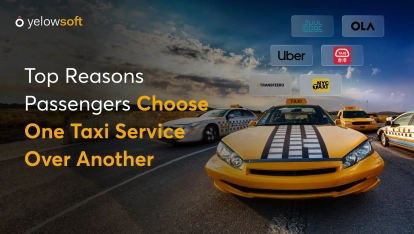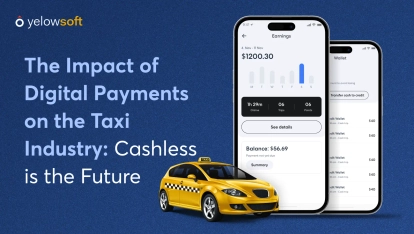Quick Summary
Are you planning to start a taxi company in South Africa? Are you confused about what you should have with you to start a successful taxi business? Did you ask existing taxi business owners about how to start a taxi business and no one gave you the answer that can satisfy you? Worry not! In this blog, you will learn every single step you should know to start a taxi business. By the end of this blog, you will master how to set up a taxi business in Africa and any other country on your own.
Starting a taxi business in a small town in South Africa can be a rewarding entrepreneurial venture, providing essential transportation services to the local community. It is also considered one of the most consistently profitable businesses if done rightly.
The taxi industry is poised to witness significant growth in the coming years in South Africa. And that’s all because of the adoption of taxi dispatch software. According to one of the studies, the revenue of this industry is estimated to reach US$0.33bn in 2024 at an annual growth rate (CAGR 2024 - 2028). It is further projected to reach a market volume of US$0.29bn by 2028.
However, jumping into the business without knowing the insights and industry can lead you to a massive failure and loss of investment.
In this blog, you will explore everything about starting a successful taxi business. Also, discover 9 steps that successful taxi businesses like Uber have followed to start a taxi business and how you can use these steps and strategies to succeed in South Africa.
So, without any more ado, let’s roll the sleeves and start the journey!
1. Conducting market research
Before embarking on starting a taxi business, you must conduct thorough market research and assess the demand and viability of the venture.

In the process of research, understand the local transportation landscape which is key to making informed decisions and tailoring your services to meet the specific needs of the community. This is how you can do thorough market research.
Assessing the demand
- Begin by evaluating the population density and demographics of the small town.
- Identify the major industries and economic activities that drive the need for transportation services.
- Additionally, analyze the existing public transportation options to identify potential gaps or areas of improvement where your taxi business can thrive.
Analyzing the competition
After assessing the demand, gain insights into the existing taxi operators in the area.
Evaluate their strengths, weaknesses, and the level of competition. Analyzing your competitors will help you identify unique selling points and differentiate your services. This ensures a competitive edge in the market.
2. Legal requirements and licensing
To operate a taxi business legally in South Africa, you must obtain the necessary licenses and permits from the relevant authorities.
Failure to comply with legal requirements can result in hefty fines or even the closure of your business. Consider the below-mentioned process and licenses to legalize your business.
Provincial regulatory entity (PRE) requirements
Each province in South Africa has a Provincial Regulatory Entity (PRE) that oversees the taxi industry. You must apply for an operating license from the PRE by providing the required documentation and paying the applicable fees.
This process may involve submitting details about your vehicles, drivers, and proposed routes.
Local municipality permits
In addition to the PRE license, you may need to obtain permits from the local municipality where you plan to operate. These permits typically cover zoning regulations, parking and loading zone requirements, and other local bylaws specific to the taxi industry.
3. Vehicle acquisition and maintenance
One of the most significant investments in starting a taxi business is acquiring suitable vehicles. You have several options to consider, each with its own advantages and disadvantages.
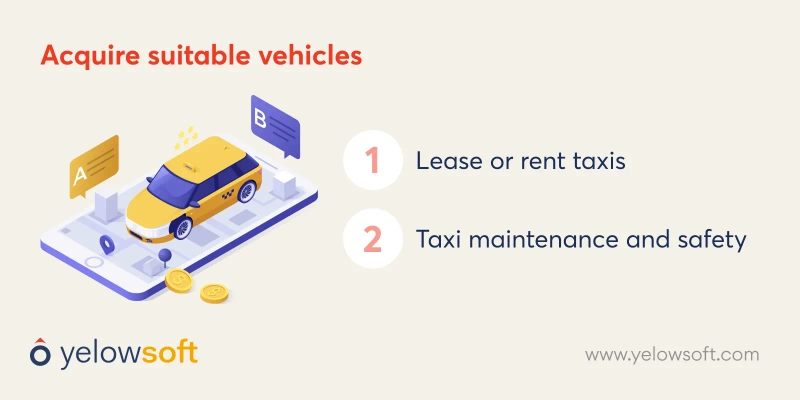
Purchasing vehicles
You can choose to purchase new or used vehicles for your taxi fleet.
New vehicles offer reliability and the latest safety features but come at a higher upfront cost.
Whereas, used vehicles are more affordable but may require more frequent maintenance and repairs.
Leasing or renting vehicles
Alternatively, you can explore leasing or renting vehicles.
Leasing vehicles will give you a long-term solution with fixed monthly payments. While renting offers flexibility for short-term or seasonal demands.
Consider the costs, terms, and budget carefully to determine the best option for your business.
Vehicle maintenance and safety
Regardless of your vehicle acquisition method, regular maintenance and adherence to safety standards are crucial. Establish a routine maintenance schedule, conduct safety inspections, and maintain accurate records to ensure the reliability and safety of your taxi fleet.
4. Hiring and managing drivers
Your drivers are the face of your taxi business. They directly interact with customers and represent your brand.

Hiring the right individuals and providing proper training and management is essential for delivering exceptional service. Learn how popular companies onboard drivers and how you can do the same.
Recruitment process
Clearly define the job descriptions and qualifications required for your drivers. Conduct thorough background checks and verify that drivers possess the necessary licenses and certifications to operate a taxi in South Africa.
Driver training
Invest in comprehensive driver training programs that cover customer service, safety protocols, and local area knowledge.
Well-trained drivers can significantly enhance the overall customer experience and maintain a positive reputation for your business.
Driver management
Implement an effective taxi dispatch system for scheduling and managing shift rotations to ensure adequate coverage and minimize driver fatigue.
Regularly monitor and evaluate driver performance. Based on it, provide feedback and support to your drivers when needed.
Additionally, establish fair compensation and benefits packages to attract and retain talented drivers.
5. Insurance and legal compliance
Protecting your taxi business from potential liabilities and ensuring compliance with labor laws are crucial for mitigating risks and avoiding legal complications.
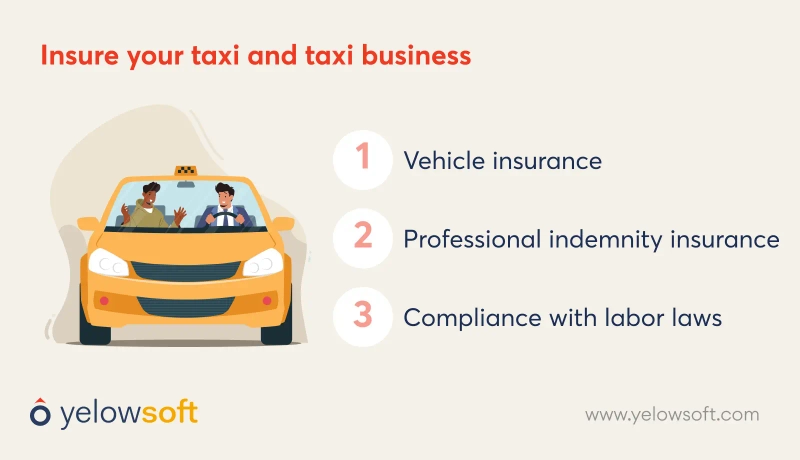
Consider these insurances for your business.
Vehicle insurance
- Obtain comprehensive vehicle insurance coverage for your taxi fleet, including liability, collision, and comprehensive policies.
- Research reputable insurance providers and compare costs to find the best coverage at an affordable rate.
Professional indemnity insurance
Consider obtaining professional indemnity insurance to protect your business from legal liabilities arising from errors, omissions, or negligence in the course of providing taxi services.
Compliance with labor laws
- Ensure that your business adheres to South African labor laws by providing employment contracts, meeting minimum wage requirements, and maintaining proper working conditions for your drivers.
- Seek legal advice or consult with labor authorities to ensure full compliance.
6. Marketing and branding
Uber and other popular taxi businesses are growing with effective marketing and branding. Consider the same strategies to attract customers and establish a strong presence in the local market.

Developing a brand identity
- Create a memorable and recognizable brand identity for your taxi business.
- Design a professional logo, choose a catchy tagline, and develop consistent visual branding that resonates with your target audience.
Marketing strategies
- Utilize a combination of local advertising channels, such as print media, radio, and community events, to raise awareness about your taxi services.
- Additionally, establish an online presence through a user-friendly taxi booking website and active social media accounts to reach a wider audience.
Customer service and retention
- Implement mechanisms for gathering customer feedback and addressing concerns promptly.
- Consider offering loyalty programs or incentives to encourage repeat business and foster customer loyalty.
7. Technology and dispatch systems
Embracing technology can streamline your operations, enhance efficiency, and improve customer satisfaction.

Taxi dispatch software solutions
- Invest in reliable SaaS-based taxi dispatch software that offers features like booking management, driver tracking, route optimization, managing an entire business from a single screen, and more.
- These solutions can help you manage your fleet more effectively, reduce operational costs, and provide a better customer experience.
Mobile apps and online booking platforms
Integrate your taxi dispatch system with taxi booking mobile apps or online taxi booking platforms to allow customers to conveniently book and track their rides in real time.
If you do not have a mobile app, you can go for the readymade white-label taxi booking app. With it, you can launch your own branded app in just 3 days with all the basic, core, and advanced features that will allow you to offer Uber-like taxi services.
This not only improves user experience but also positions your business as a modern and tech-savvy service provider.
8. Financial planning and management
Proper financial planning and management are essential for the long-term sustainability and growth of your taxi business. Follow the below-mentioned points for better financial planning and management.
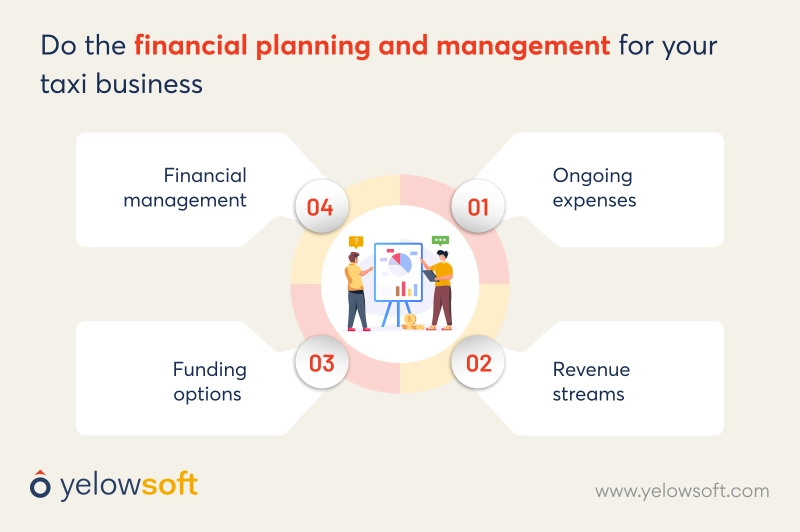
Startup costs
Carefully estimate and budget for the initial startup costs. This includes vehicle acquisition, licensing and permit fees, office or dispatch center setup, and marketing and branding expenses.
Ongoing expenses
- Consider ongoing expenses such as fuel and maintenance costs, insurance premiums, driver salaries and benefits, and technology and software subscriptions.
- Ensure that your pricing structure and revenue streams can cover these expenses while allowing for profitability.
Revenue streams
- Develop a fair and competitive fare structure based on market rates and customer demand.
- Additionally, explore potential revenue streams like airport transfers, corporate accounts, or package delivery services to diversify your offerings.
Funding options
If you require additional funding, research options such as small business loans, seeking investors or partners, or exploring government grants and support programs for small businesses in South Africa.
Financial management
- Implement the best financial management practices, including proper bookkeeping, accounting, cash flow management, and tax planning and compliance.
- Consider hiring professional accountants or seeking advice from financial experts to ensure accurate financial reporting and optimal tax strategies.
9. Growth and expansion strategies
As your taxi business gains traction, explore opportunities for growth and expansion to capitalize on your success.
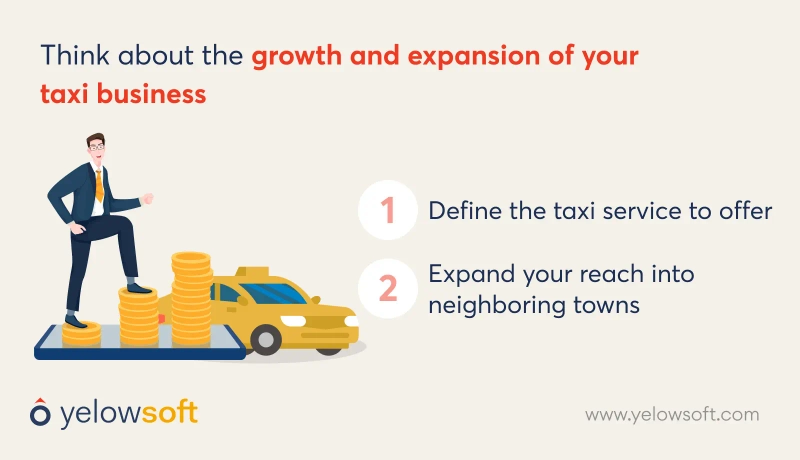
Diversifying services
Consider diversifying your services to cater to different customer segments or market demands.
For example, you could offer taxi transfer services to;
-
Corporate clients - Provide taxi commutation service to only corporate clients. It has a fixed pickup and drop location for fixed employees. To offer top-class corporate taxi transfer services, you will need top-class corporate taxi booking software.
-
Airport transfers - Just serve the passengers to and from airports. This service often has dedicated pick-up areas and schedules pick-ups in advance. One of the key factors in offering airport transfers is picking up and dropping the passengers on time.
And offering all these manually is nearly impossible. Hence, you will need reliable airport taxi dispatch software to manage every aspect of your business with ease.
-
Ride hailing - This is what Uber and Lyft have been providing and have become popular fast among the passengers. They have technology as their success partner and it's called ride-hailing software. You can either go for the development of it from scratch or look for an Uber clone app to offer Uber-like services with a bare minimum investment.
-
Taxi dispatch - If you plan to offer a taxi dispatch service with the aim of scheduling, coordinating, and routing taxis for passengers, you will need an advanced taxi dispatch system. Consider having the one that is under your budget yet offers top-notch features to simplify your business management.
Expanding to neighboring towns
- When you get success in your local town or region, then you can think of expanding your business radius. Conduct market research and feasibility analyses to identify potential opportunities for expansion into neighboring towns or regions.
- Carefully plan for scaling your operations, fleet management, and staffing to accommodate growth while maintaining quality service.
Conclusion
Starting a taxi business in a small town in South Africa presents both challenges and opportunities. Following a well-structured plan and considering each step explained above in the blog can help you increase your chances of success in this competitive industry.
And the most important thing in today’s digital era is partnering or taking help from technology. Start your taxi business with your own branded taxi booking application that presents you as a brand in the hearts of your customers. This helps you drive more trips and loyal passengers.
And yes, remember that patience, perseverance, and a commitment to exceptional customer service are key to building a thriving taxi business that serves the transportation needs of the local community. And this can be offered only when you have the best taxi dispatch software.

FAQ's
The first step in starting a taxi business is conducting thorough market research to assess the demand for taxi services in your area, analyze the competition, determine the potential viability and profitability of your venture, adapt a reliable taxi booking software, and more. This research will guide your decision-making process and help you develop a solid business plan.
When purchasing vehicles for your taxi fleet, consider factors such as passenger capacity, fuel efficiency, accessibility features (if required), and initial and ongoing maintenance costs. Additionally, evaluate the reliability, safety features, and professional image that different vehicle models can provide. Your budget and target customer segment should also influence your vehicle selection.
To start a profitable taxi business in South Africa, the key lies in proper planning and execution. First,
- Conduct thorough market research to understand the demand, competition, and potential profitability in your target area.
- Develop a solid business plan
- Obtain the necessary licenses and permits
- Invest in reliable vehicles and well-trained drivers
- Embrace technology solutions like taxi dispatch software and mobile apps to streamline operations and enhance customer experience.
Starting a taxi business with just one car is certainly possible, but it requires careful planning and a strategic approach. Begin by conducting market research, obtain the necessary licenses and permits, and ensure compliance with all legal requirements. Develop a strong online presence. Offer personalized and attentive service to build a loyal customer base. As your business grows, consider gradually expanding your fleet to meet increasing demand.
The cost of starting a taxi business in South Africa can vary considerably depending on various factors. Some key expenses to consider include;
- The cost of acquiring or leasing vehicles (which can range from a few thousand Rands for a used car to hundreds of thousands for a new fleet)
- Licensing and permit fees
- Insurance premiums
- Office or dispatch center setup -Marketing and branding expenses
- Initial salaries for drivers and staff
- You'll need to factor in ongoing expenses like fuel, maintenance, software subscriptions, and other operational costs
It's advisable to conduct a detailed financial analysis and develop a comprehensive business plan to accurately estimate the startup and ongoing costs specific to your business model and location.


